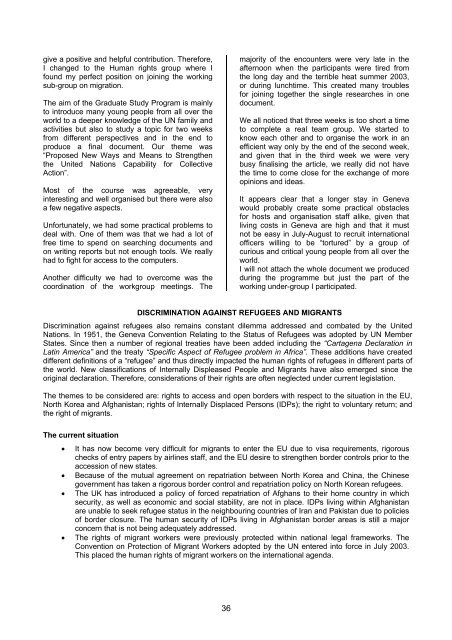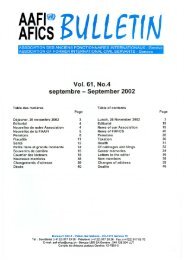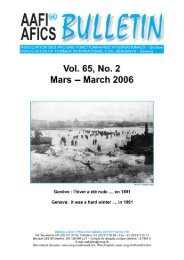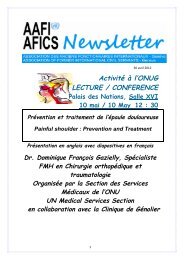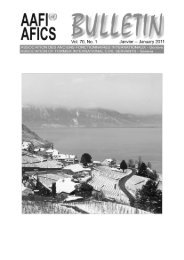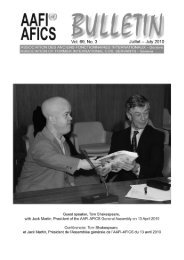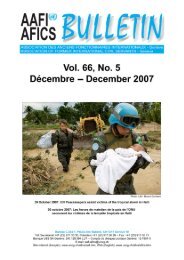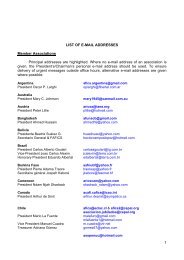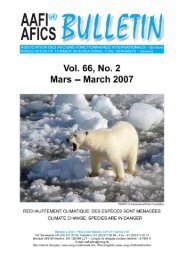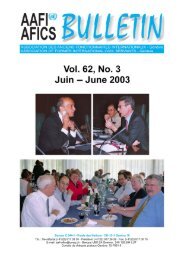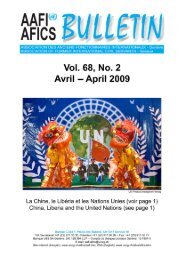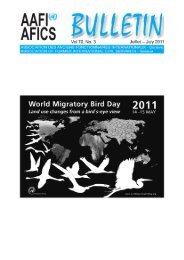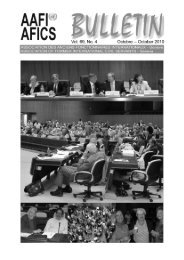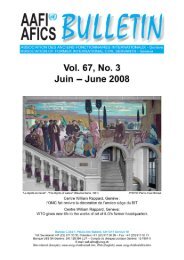nouvelles de notre association - aafi-afics - UNOG
nouvelles de notre association - aafi-afics - UNOG
nouvelles de notre association - aafi-afics - UNOG
You also want an ePaper? Increase the reach of your titles
YUMPU automatically turns print PDFs into web optimized ePapers that Google loves.
give a positive and helpful contribution. Therefore,<br />
I changed to the Human rights group where I<br />
found my perfect position on joining the working<br />
sub-group on migration.<br />
The aim of the Graduate Study Program is mainly<br />
to introduce many young people from all over the<br />
world to a <strong>de</strong>eper knowledge of the UN family and<br />
activities but also to study a topic for two weeks<br />
from different perspectives and in the end to<br />
produce a final document. Our theme was<br />
“Proposed New Ways and Means to Strengthen<br />
the United Nations Capability for Collective<br />
Action”.<br />
Most of the course was agreeable, very<br />
interesting and well organised but there were also<br />
a few negative aspects.<br />
Unfortunately, we had some practical problems to<br />
<strong>de</strong>al with. One of them was that we had a lot of<br />
free time to spend on searching documents and<br />
on writing reports but not enough tools. We really<br />
had to fight for access to the computers.<br />
Another difficulty we had to overcome was the<br />
coordination of the workgroup meetings. The<br />
majority of the encounters were very late in the<br />
afternoon when the participants were tired from<br />
the long day and the terrible heat summer 2003,<br />
or during lunchtime. This created many troubles<br />
for joining together the single researches in one<br />
document.<br />
We all noticed that three weeks is too short a time<br />
to complete a real team group. We started to<br />
know each other and to organise the work in an<br />
efficient way only by the end of the second week,<br />
and given that in the third week we were very<br />
busy finalising the article, we really did not have<br />
the time to come close for the exchange of more<br />
opinions and i<strong>de</strong>as.<br />
It appears clear that a longer stay in Geneva<br />
would probably create some practical obstacles<br />
for hosts and organisation staff alike, given that<br />
living costs in Geneva are high and that it must<br />
not be easy in July-August to recruit international<br />
officers willing to be “tortured” by a group of<br />
curious and critical young people from all over the<br />
world.<br />
I will not attach the whole document we produced<br />
during the programme but just the part of the<br />
working un<strong>de</strong>r-group I participated.<br />
DISCRIMINATION AGAINST REFUGEES AND MIGRANTS<br />
Discrimination against refugees also remains constant dilemma addressed and combated by the United<br />
Nations. In 1951, the Geneva Convention Relating to the Status of Refugees was adopted by UN Member<br />
States. Since then a number of regional treaties have been ad<strong>de</strong>d including the “Cartagena Declaration in<br />
Latin America” and the treaty “Specific Aspect of Refugee problem in Africa”. These additions have created<br />
different <strong>de</strong>finitions of a “refugee” and thus directly impacted the human rights of refugees in different parts of<br />
the world. New classifications of Internally Displeased People and Migrants have also emerged since the<br />
original <strong>de</strong>claration. Therefore, consi<strong>de</strong>rations of their rights are often neglected un<strong>de</strong>r current legislation.<br />
The themes to be consi<strong>de</strong>red are: rights to access and open bor<strong>de</strong>rs with respect to the situation in the EU,<br />
North Korea and Afghanistan; rights of Internally Displaced Persons (IDPs); the right to voluntary return; and<br />
the right of migrants.<br />
The current situation<br />
• It has now become very difficult for migrants to enter the EU due to visa requirements, rigorous<br />
checks of entry papers by airlines staff, and the EU <strong>de</strong>sire to strengthen bor<strong>de</strong>r controls prior to the<br />
accession of new states.<br />
• Because of the mutual agreement on repatriation between North Korea and China, the Chinese<br />
government has taken a rigorous bor<strong>de</strong>r control and repatriation policy on North Korean refugees.<br />
• The UK has introduced a policy of forced repatriation of Afghans to their home country in which<br />
security, as well as economic and social stability, are not in place. IDPs living within Afghanistan<br />
are unable to seek refugee status in the neighbouring countries of Iran and Pakistan due to policies<br />
of bor<strong>de</strong>r closure. The human security of IDPs living in Afghanistan bor<strong>de</strong>r areas is still a major<br />
concern that is not being a<strong>de</strong>quately addressed.<br />
• The rights of migrant workers were previously protected within national legal frameworks. The<br />
Convention on Protection of Migrant Workers adopted by the UN entered into force in July 2003.<br />
This placed the human rights of migrant workers on the international agenda.<br />
36


